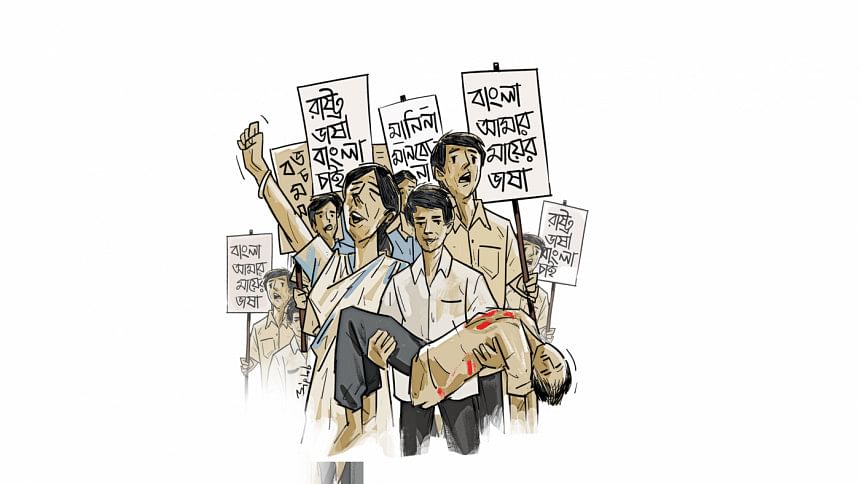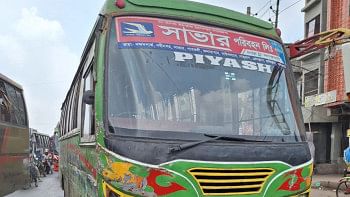Language Movement in Pabna

This year marks the 73rd anniversary of the 1952 Language Movement. Drawing on research based on various published books, this 21-part series tells the story of the historic struggle for our mother tongue.
During the 1948-1952 Language Movement, the people of Pabna defied the authority's oppressive measures and fought to recognise their mother tongue.
On February 21, 1952, despite the imposition of Section 144, a draconian measure aimed at suppressing demonstrations, students from Edward College flooded the streets, demanding Bangla as the state language.
Their cries, "Rashtrobhasha Bangla Chai!" reverberated through the town. The police attempted to quash the march, but the determined students broke through barricades and proceeded to the Collectorate building. Several protesters were arrested near Bani Cinema Hall.
That evening, devastating news arrived from Dhaka—students had been shot and killed for the same cause. People from all walks of life poured onto the streets in protest.
The following day, on February 22, a public meeting was held at Edward College to condemn the killings and demand exemplary punishment for the perpetrators.
EARLY DAYS
The district's involvement in the struggle for the recognition of Bangla began even before 1952.
In February 1948, when Dhirendranath Dutta, a member of the Constituent Assembly of Pakistan, proposed Bangla as a working language at one of its sessions, only to be met with staunch opposition from Khwaja Nazimuddin, chief minister of East Bengal, students in Pabna burst into protests, as did their peers in Dhaka.
According to Dr Abdul Alim's book "Pabna e Bhasha Andolon", under the leadership of Dewan Lutfar Rahman, the convener of the local Sangram Parishad, and active participation from progressive student leaders and political activists, the movement gained traction.
Despite attempts by the deputy commissioner to pacify the demonstrators through negotiations, the students remained unwavering. The imposition of Section 144 failed to quell the uprising.
Pabna witnessed a complete shutdown on February 29, 1948, with a general strike bringing the town to a halt. The arrest of student leader Mahbubur Rahman only served to fuel the fire, as activists prepared for a national day of action on March 11.
Authorities, sensing the rising momentum, attempted to prevent the protests by arresting key figures like Amjad Hossain and Rawshan Chowdhury on March 10.
However, the people of Pabna retaliated with a spontaneous strike on March 11, and thousands of students, led by Abdul Matin and Md Sultan, student leaders from Dhaka, took to the streets, raising their voices for Bangla.
EDWARD COLLEGE
As per Ahmed Rafiq's book "Bhasha Andolon: Teknaf to Tetulia", by 1952, Pabna had become a significant force in the movement. Edward College played a central role in organising protests and rallies, with Abdul Momin Talukder leading the local All-Party State Language Action Committee alongside Azizul Haque.
A defining moment came on February 17, when Maulana Abdul Hamid Khan Bhashani, a towering political figure, addressed a mass gathering at Edward College.
His speech motivated the students, urging them to stand firm in their demand for their mother tongue.
As February 21 approached, the city was draped in posters proclaiming the call for Bangla as the state language.
On the night of February 20, an emergency meeting at Edward College resolved to defy Section 144.
According to the book "Pabna e Bhasha Andolon", the following day, a hartal (general strike) ensued, with thousands marching in defiance of state restrictions, leading to confrontations with police and arrests.
The fight for Bangla was not restricted to Pabna town alone; it spread to nearby areas like Sirajganj (now a separate district), Chatmohar, and Ishwardi.
Pabna's contribution to the Language Movement will always be etched in Bangladeshi history. The courage and resilience of its students and leaders in the face of adversity ultimately led to the recognition of Bangla as the state language.
Translated and edited by Subrata Roy.
//600

 For all latest news, follow The Daily Star's Google News channel.
For all latest news, follow The Daily Star's Google News channel. 



Comments